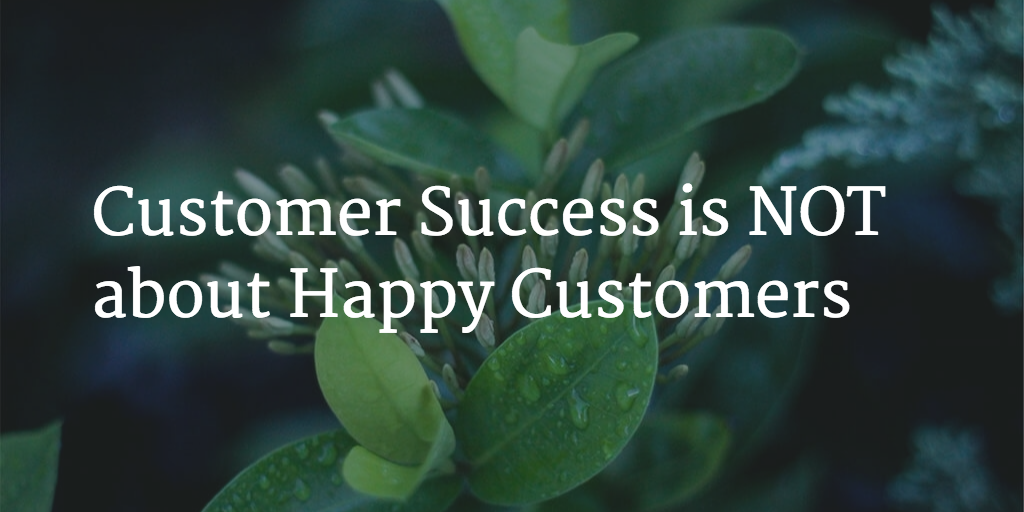Customer Success is NOT about creating Happy Customers.
While I agree generally with the thesis of this Harvard Business Review article correlating customer satisfaction with long-term customer loyalty, I have to take issue with – if not their findings – the delivery of those findings that could cause confusion.
Particularly, I take issue with this quote: “Unhappy customers are expensive – being, for example, more likely to return products or more likely to require support.“
I’m sorry, but in many situations, from high-value B2B scenarios like Software-as-a-Service (SaaS) – which I’ll cover below – to consumer e-commerce (think: Zappos’ super-easy physical product return policy), this couldn’t be further from reality.
So let me reiterate: Customer Success is NOT about creating Happy Customers.
Ask a Customer Success Manager (CSM) that’s working the front lines and they’ll tell you; “successful” does NOT equal “happy” when it comes to customers.
It’s not the job of Customer Success to make customers happy. It’s not your job as a company to make your customers happy.
Happy is a feeling. Happy is subjective. Happy is qualitative.
Successful – having set and reached a goal – isn’t a feeling. It isn’t subjective.
Success is totally quantifiable.
Now, at a human level, happy is a nice to have, of course. And you obviously don’t want to make your customers unhappy or cause them to have a bad experience, that’s not what I’m saying.
In fact, you must work diligently to make the process and experience as wonderful as possible.
But providing that wonderful user experience along with a fantastic customer experience, and all the functional bells and whistles they require is part of making them successful, not happy.
This may seem like semantics – happy vs. successful – but if you want to have a realistic perspective on your customer health, you need to look at things the right way.
Your most successful customers – those least likely to churn and more likely to buy more over time – are generally your most demanding and they never seem to be happy.
That’s going to seem like a problem if you don’t understand how things actually work.
But if you understand that happiness isn’t your goal – success leading to loyalty is – then you won’t fall victim to wrongheaded thinking when analyzing customer health.
Your “happy” customers – you know, the ones you never hear from or interact with, the ones that never complain or contact support – they’re actually the ones to be worried about. You don’t know if they’re successful.
You don’t know if they’ve got one foot out the door. You don’t have any real context; you just assume they’re “happy” because they gave you a 10 on your NPS survey. (Did you follow-up to take advantage of that “Promoter” and to get additional context?)
Your best customers, on the other hand…
- aren’t content with where they are
- they aren’t static
- they aren’t comfortable
- they’re certainly not satisfied with the status quo
- they’re heavy, active users
- they break stuff
- they contact support
- they respond to surveys honestly and thoughtfully (and rarely with all 10’s)
- they use your product in ways it wasn’t designed (which causes problems)
- and they contact support again
- they need to integrate and to customize (if not at first, over time)
- they often have open tickets, professional services contracts, a pending integration, etc.
- they attend your training
- they consume your marketing materials, webinars, attend events
- they complain to you often
- they have a strong Customer Health Score
- they reach the goals you set together
- they tell others how great you are
- they worry
- they call
- they email
- they complain
- they praise you (to others)
- they stay
- they renew
- and they buy more seats or capacity
- they buy the add-ons
- they buy your training
- they pay to attend events
- they speak at your events
- they participate in your marketing
- they’re your biggest advocates
They aren’t happy…
But they are successful.
It’s your job to keep ‘em that way.
If you’re trying to solve for “happy” you’re doing Customer Success wrong.
`
Find out how to do Customer Success right… enroll in Customer Success University now.


